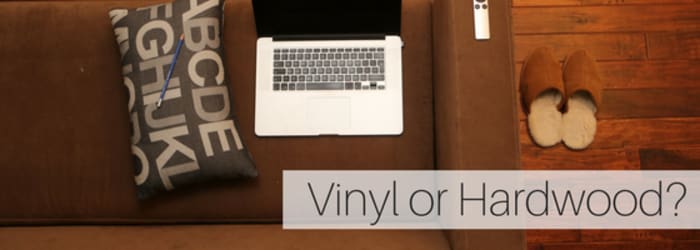All About Hardwood Flooring
Hardwood flooring has a classic, timeless appeal. Not only is wood flooring beautiful, but it can enhance the look and value of your home. Hardwood is easy to maintain, as long as you sweep and/or vacuum regularly and occasionally use a wood floor cleaner. Hardwood is also incredibly durable and long-lasting. There are many types of hardwood flooring available in a variety of colors and styles, so matching the decor and look of your home is not an issue.
When it comes to wood flooring, there are two options: solid wood and engineered wood. Both can add value to your home but are best used in different scenarios. Solid wood is susceptible to humidity and temperature change, so it's best used in rooms that have a controlled temperature. Solid wood is exceptionally durable and can be sanded and refinished multiple times. It comes in planks and is offered in a variety of widths. Installation can be labor-intensive, as it requires nailing solid wood to the subfloor.
Engineered flooring is made up of layers of real wood. The top and bottom layers are made of 100% natural wood, while the middle layers are made of other types of wood like plywood that criss-cross in a number of directions. Engineered wood is less susceptible to expansion due to humidity or temperature changes, so it can be used in a larger variety of places in your house. Engineered wood comes in either plank or long strip formats in multiple widths for greater flexibility. Installation is typically easier with engineered wood as the possibilities including glue or staples, and overall cost tends to be lower since less of the species wood is used.
All About Vinyl Flooring
Many people confuse vinyl and laminate flooring, but there is a big difference between the two. While laminate is made almost entirely of wood, vinyl flooring is 100% plastic. While plastic certainly comes with a certain image, today's vinyl options come in long planks and mimic a wood look for a fraction of the cost. It's extremely durable, water-resistant flooring. It's a great option for areas of the home with moisture and can be quite cost-effective.
Like wood flooring, there are two different types of vinyl flooring: sheet flooring and tile flooring. With vinyl sheet flooring, you'll get large, solid, unbroken pieces of vinyl. While not as customizable as tile, vinyl sheets still come in a variety of patterns, colors, and image options. One major advantage of vinyl sheet flooring is cost; because it comes in large sheets, there is less precision and waste involved. Vinyl sheets are also more water resistant because there is no seam running between tiles.
Vinyl tile flooring comes with more options and variety than vinyl sheet flooring. There are endless options for design and style with vinyl tile, and it can be installed in any desired configuration. Vinyl tile tends to run more expensive than sheet because it requires more cutting and installation work.
Hardwood vs Vinyl: What's Right for Me?
What's right for you depends on where you are planning to install flooring, as well as your budget and preference in look. Hardwood is not recommended in areas with moisture. It can also be louder, so depending on your home, it may not be the best option for the highest trafficked of areas. Vinyl, in contrast, is a good option for areas of moisture. It's a softer material, so it can be scratched or gouged by sharp objects or heavy furniture. From a budget perspective, vinyl is hands down the more cost-efficient option; but hardwood adds more value to your home. There can be a place for both styles of flooring though.
Here are our recommended placements for hardwood and vinyl flooring:
Suggested locations for hardwood:
- Living Room (Solid or Engineered)
- Dining Room (Solid or Engineered)
- Bedrooms (Solid or Engineered)
- Kitchen (Engineered)
- Stairs (Solid)
Suggested locations for vinyl:
- Hallway (Sheet or Tile)
- Kitchen (Sheet or Tile)
- Laundry Room (Sheet or Tile)
- Bathroom (Sheet or Tile)
- Basement (Sheet or Tile)
Are you ready to get started installing new floors in your home? Or do you want to talk with a specialist in more depth about these options?Contact the Denver Carpet and Flooring team now to set up an appointment.






